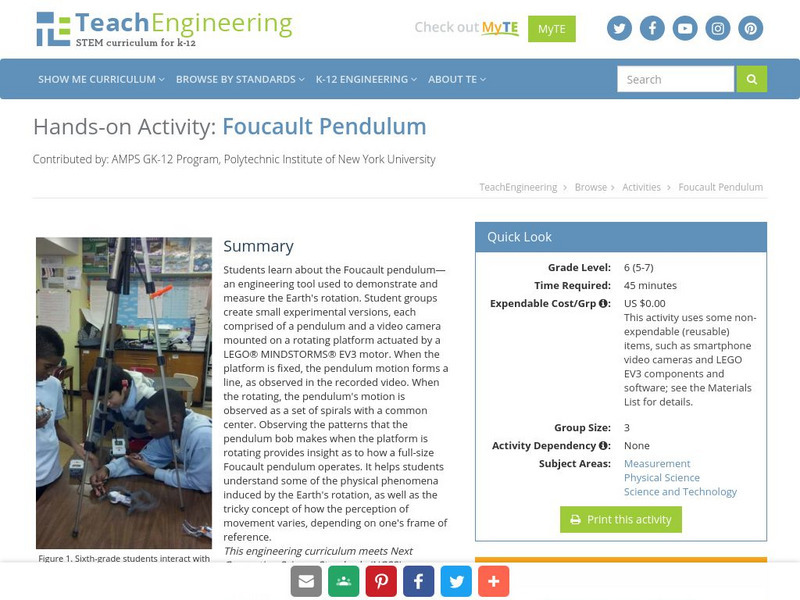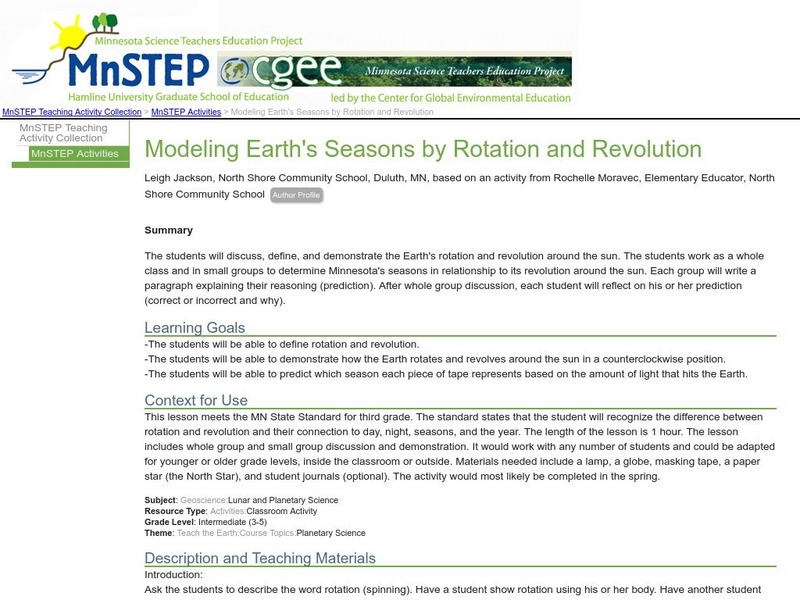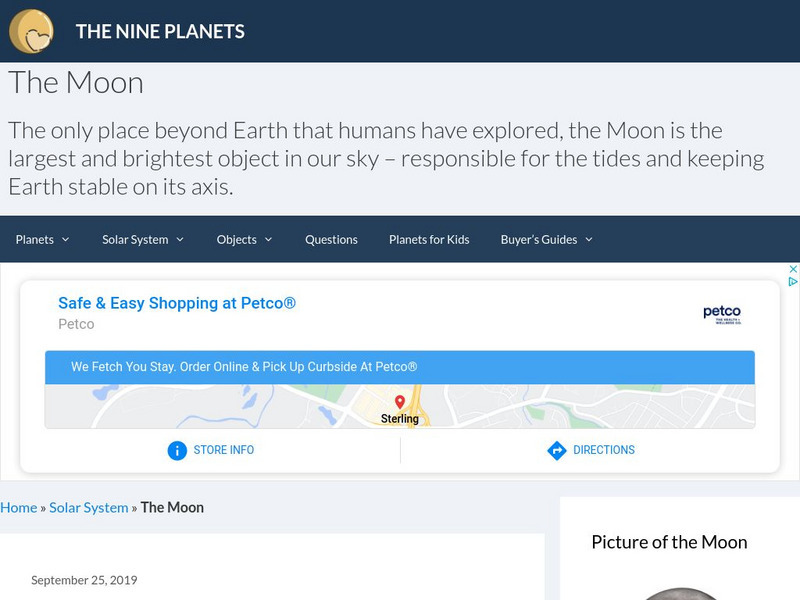Other
Earth Science: Earth's Surface and Heat [Pdf]
This textbook chapter looks at the role of temperature in sustaining life on Earth and on weather and climate. It discusses the Earth's movements and the seasons, the circulation of the oceans, wind and weather, and the water cycle....
Utah Education Network
Uen: The Night Sky
Learn about the rotation of the earth, the movement of the moon, and the position of the sun.
BBC
Bbc Schools: Ks2 Bitesize: Science: Physical Processes: Earth, Sun, and Moon
Help Sarah Jane and her team put the solar system's planets back in order. Following the activity, read more about the sun, the Earth, and its moon, and then take a quick quiz to check for understanding.
Science Buddies
Science Buddies: Kinesthetic Astronomy: Earth's Rotation
This kinesthetic activity will demonstrate concepts like rotation and orbit, clarify movement and direction, and help young scholars understand why earthlings see different things in the sky.
Science Education Resource Center at Carleton College
Serc: Mn Step: The Earth and Sky in a 24 Hour Day
An activity where young scholars learn, through modeling and demonstration, about the relative sizes of the Earth and Sun, the distance between them, and how the Earth rotates in a 24-hour period.
TeachEngineering
Teach Engineering: Foucault Pendulum
Students learn about the Foucault pendulum, an engineering tool used to demonstrate and measure the Earth's rotation. Student groups then create small experimental versions, each comprised of a pendulum and a video camera mounted on a...
Texas Education Agency
Texas Gateway: The Sun Is the Center of the Solar System
See what you know about the solar system by taking this brief interactive quiz and learning module.
PBS
Pbs Learning Media: Sunspots on the Move
The following videos show sunspots using wavelengths of light that the human eye cannot see. Watch sunspots emerging on the earth's surface, a sunspot moving across the earth's surface, and the rotation of the sun as a sunspot evolves...
NASA
Nasa: Eclipse Predictions and Earth's Rotations
An insightful website from NASA that presents a series of different questions about the rotation of the Earth.
Scholastic
Scholastic: Study Jams! Science: Our Solar System: A Day on Earth
A video and a short multiple-choice quiz on how the Earth's tilt on its axis, its rotation, and its orbit around the Sun give us a 24-hour day, a 365-day year, and our seasons.
Science Buddies
Science Buddies: A Matter of Degrees: Tilt of Earth's Axis Affects the Seasons
In this science fair project, use a globe and a heat lamp to investigate how the angle of the Sun affects global warming. This project includes the objective, background questions, a list of all the materials you'll need, and the...
Science Education Resource Center at Carleton College
Serc: Modeling Earth's Seasons by Rotation and Revolution
In this lesson plan, students will discuss, define, and demonstrate the Earth's rotation and revolution around the sun in a counterclockwise position. They will be able to predict seasons based on the amount of light that hits the Earth.
Science Education Resource Center at Carleton College
Serc: Mn Step: Rotation of the Earth
A KWL activity combined with a demonstration model. Students record their ideas and questions about why we have day and night. They then shine a flashlight (the Sun) on a rotating styrofoam ball (the Earth) and record their observations....
Science Education Resource Center at Carleton College
Serc: Investigating Rotation: Why Is There Day and Night?
In this rotation activity, students investigate what causes day and night by participating in a classroom activity. Students will observe, question, and investigate how the relationship between the earth and sun causes day and night.
Utah Education Network
Uen: Earth and Moon Observations
Earth's revolution, rotation, tilt, day and night cycle, and the sun's apparent movement across the earth are explored.
Nine Planets
The Nine Planets: The Moon
Explore the mythology, structure, observational history, gravitational force, and orbit of Earth's Moon.
NASA
Nasa: The Sun
An introduction to the Sun including its size and distance from the Earth, sunspots, flares and coronal mass ejections.
CK-12 Foundation
Ck 12: Fifth Grade Science: Earth Science: Earth's Motion in Space
[Free Registration/Login may be required to access all resource tools.] Discusses the motion of the Earth with its day and night cycle, the seasons, the Earth's orbit around the Sun, and its year-long cycle.
Utah Education Network
Uen: Reasons for the Seasons
Lesson plan addresses misconceptions about seasonal changes and Earth's orbit through a pre-lesson plan survey and follow-up experiments to scientifically study the answers to questions found in the survey. Includes great teacher...
Math Is Fun
Math Is Fun: The Seasons
Learn about the four seasons, when they occur in the northern and southern hemispheres, and why the seasons change as the Earth rotates around the Sun.
University of Wisconsin
University of Wisconsin: Reasons for the Seasons
A brief explanation of the Earth's rotation around the Sun and how it relates to the amount of sunlight the Earth receives, and to the seasons. Includes two questions for students to respond to.
Utah Education Network
Uen: As the World Turns
Third graders use their bodies to act out the motions of earth.
Georgia Department of Education
Ga Virtual Learning: The Moon
In this interactive tutorial students will explore what it is like on the Moon. Learn why the shape of the Moon seem to change and also about lunar eclipses. Discover why the tide changes twice a day and explore how the cycle of the Moon...
![Earth Science: Earth's Surface and Heat [Pdf] eBook Earth Science: Earth's Surface and Heat [Pdf] eBook](https://static.lp.lexp.cloud/images/attachment_defaults/resource/large/FPO-knovation.png)














